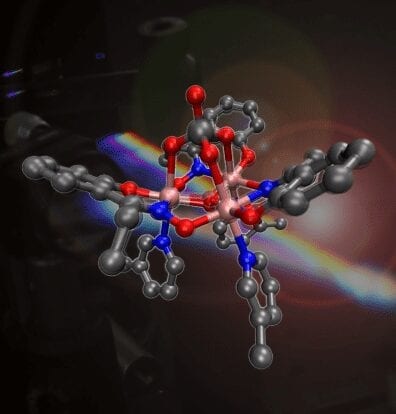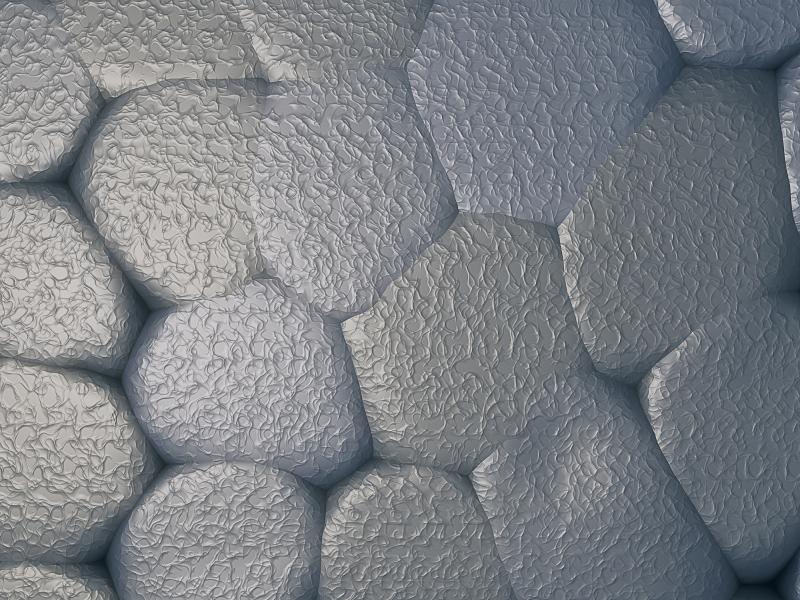Computer model of a single-molecule magnet
Data speeds to soar with aid of mini magnets
Tiny, laser-activated magnets could enable cloud computing systems to process data up to 100 times faster than current technologies, a study suggests.
Chemists have studied a new magnetic material that could boost the storage capacity and processing speed of hard drives used in cloud-based servers.
This could enable people using cloud data systems to load large files in seconds instead of minutes, researchers say.
Magnetic molecule
A team led by Edinburgh scientists created the material – known as a single-molecule magnet – in the lab.
They discovered that a chemical bond that gives the compound its magnetic properties can be controlled by shining rapid pulses from a laser on it.
The compound is composed mainly of the element manganese, which is named after the Latin word magnes, which means magnet.
Laser pulses
The team’s findings suggest that data could be stored and accessed on the magnets using laser pulses lasting one millionth of a billionth of a second.
They estimate this could enable hard drives fitted with the magnets to process data up to 100 times faster than current technologies.
Improved efficiency
The development could also improve the energy efficiency of cloud computing systems, the team says, which collectively emit as much carbon as the aviation industry.
Existing hard drives store data using a magnetic field generated by passing an electric current through a wire, which generates a lot of heat, researchers say.
Replacing this with a laser-activated mechanism would be more energy efficient as it does not produce heat.
There is an ever-increasing need to develop new ways of improving data storage devices. Our findings could increase the capacity and energy efficiency of hard drives used in cloud-based storage servers, which require tremendous amounts of power to operate and keep cool. This work could help scientists develop the next generation of data storage devices.
The Latest Updates from Bing News & Google News
Go deeper with Bing News on:
Laser-activated magnets
- Laser light makes a material magnetic
By applying laser light that is both circularly polarized – that is, its polarization traces out a corkscrew-like shape as it propagates – and resonant with the frequency of atomic oscillations within ...
- Making light 'feel' a magnetic field like an electron would
Unlike electrons, particles of light are uncharged, so they do not respond to magnetic fields. Despite this, researchers have now experimentally made light effectively "feel" a magnetic field within a ...
- magnetic stripe
A 1970s programmable calculator from Sharp approached the problem with magnetic strips on special cards, and since [Menadue] has one with no cards, he set about making his own. These cards are a ...
- Ultrafast laser-powered 'magnetic RAM' is on the horizon after new discovery
Researchers have found an elemental physical interaction between light and magnetism that might lead to the next generation of computing memory.
- Magnets are switching up the keyboard game
The next big thing in mechanical keyboards is magnetic switches. Mechanical keyboards quickly went from a niche product to mainstream during the pandemic, as everybody was looking to upgrade their ...
Go deeper with Google Headlines on:
Laser-activated magnets
[google_news title=”” keyword=”laser-activated magnets” num_posts=”5″ blurb_length=”0″ show_thumb=”left”]
Go deeper with Bing News on:
Single-molecule magnet
- Viking Therapeutics, Inc. (NASDAQ:VKTX) Q1 2024 Earnings Call Transcript
Q1 2024 Earnings Call April 24, 2024 Viking Therapeutics, Inc. beats earnings expectations. Reported EPS is $-0.26, expectations were $-0.27. Viking Therapeutics, Inc. isn’t one of the 30 most popular ...
- The 12 Best Self-Tanning Lotions for a Vacation-Worthy Glow
Though few things are more relaxing than sunbathing, informed beauty lovers know achieving a sun-kissed glow without exposure to harmful UV rays is optimal for skin health. If you’re looking for a ...
- Individual polyatomic molecules are trapped in optical-tweezer arrays
Individual polyatomic molecules have been trapped in arrays of optical tweezers for the first time. Researchers in the US were able to control individual quantum states of the three-atom molecules and ...
- These 8 Pheromone Perfumes Will Make You Irresistible
Pheromone perfumes interact with your natural scent, creating an irresistible bespoke fragrance. Discover the eight best pheromone perfumes, according to experts and editors.
- Rechargeable Afterglow Nanotorches for in-vivo Tracking of Cell-Based Microrobots
An afterglow luminescent nanoprobe expands the potential for imaging live cells. According to a study published in Angewandte Chemie , a novel “nanotorch” could light up for more than 10 days ...
Go deeper with Google Headlines on:
Single-molecule magnet
[google_news title=”” keyword=”single-molecule magnet” num_posts=”5″ blurb_length=”0″ show_thumb=”left”]











